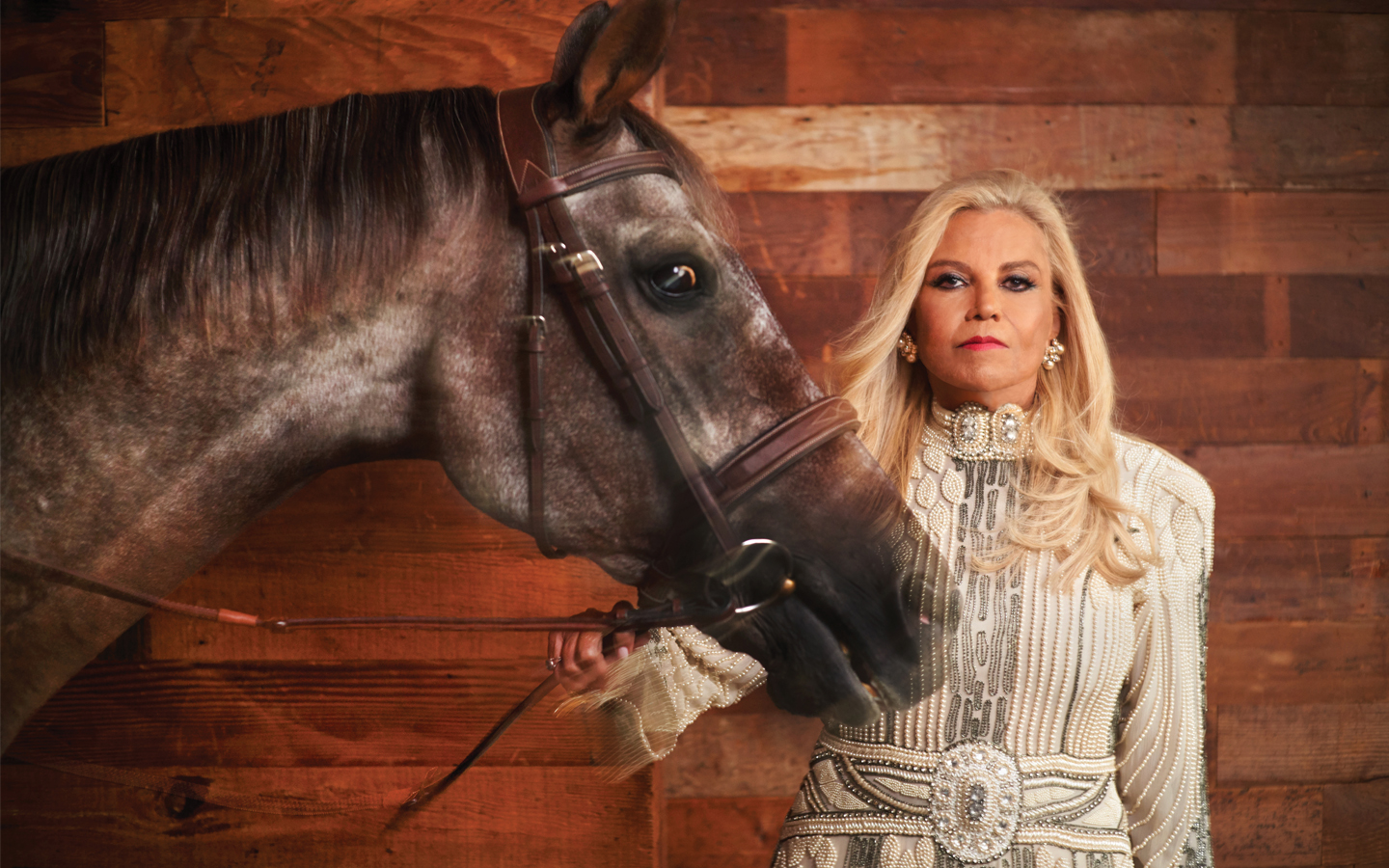
Suzanne de Passe
TEXT RUTH ADKINS ROBINSON
VISUAL MEENO PELUCE
The pattern of her life’s work is clear. Her brilliance, wit and determination simply kicked obstacles out of the way, not to mention the high kick that knocked out any glass ceilings in the entertainment business.
The Suzanne de Passe story has taken on the mantle of myth and legend. It’s been retold in Harvard Business School Case Studies—there have been two on her in print, during a thousand interviews, and as portrayed by Vanessa Williams in the miniseries The Jacksons: An American Dream.
de Passe was born in that bastion of art, history and culture known as Harlem, N.Y., to parents who divorced when she was three-years-old, but remained on good terms. When her father remarried six years later, de Passe says she “had the benefit of an extremely harmonious relationship between three people.” Primarily it was her mother, Babs, and Babs’ two sisters that gave Suzanne great insight into what it meant to be an independent woman. This woman, who has always been lauded for her boldness where others might have hesitated, points out, “I was raised by strong women and that gives you the environment and encouragement that brings out the boldness in you.”
She was also taught the value of hard work and to appreciate all the good things that came her way, no matter how hard she had to fight to get others to see things as she did. Highly opinionated about almost everything, she let the owners at the famed Cheetah dance club know what she thought of the talent they were hiring and ended up as the club’s talent booker for a staggering sum of $125 a week. It was this salary that allowed her to pay for the limousine that literally rode her into the history books when she ended up giving Berry Gordy a ride when his limo went missing.
Gordy was impressed many months later when de Passe criticized the way Motown operated when she was trying to book his artists. He ended up offering her a job.
Gordy became her mentor, and began teaching her both the creative and business side of the business. Over the next few years, de Passe worked in every capacity at Motown, helping to pick new talent and going on the road with artists. She kept reaching for excellence, all the while intimidated by “Mr. Gordy.” She “had never seen anyone treated like the world treated him.” He was a man who knew how to surround himself with winners who could do the jobs he needed done. Among them was de Passe.
A phone call from her neighbor Bobby Taylor, of Motown act Bobby Taylor & the Vancouvers set her career in motion.
“Bobby called me and said, ‘I’d like you to come down to my apartment. There’s something I think you should see.’”
That something was a family group – the Jackson 5. She told Mr. Gordy “who flatly refused to deal with a bunch of kids,” de Passe relates. He’d already had enough of the chaos pre-teen jokester Little Stevie Wonder was creating. Still, she kept gently pushing Gordy, looking, she says, for a “slow yes, instead of a fast no.”
Eventually, he capitulated. “Mr. Gordy put my cousin, Tony Jones, and me in charge of everything but making the recordings,” she recalls. “We did the choreography for “I Want You Back,” in my living room.”
Jones adds “We dressed them from our closets, until we could shop for them in stores and finally get them a designer for custom costumes. We went with them as they went from totally unknown to Beatle-like fame in what seemed like minutes.”
According to de Passe, “Soon they were playing stadiums and we had to send a decoy limo out to distract the thousands of fans, so we could slip away from the venues in a paneled truck.”
As part of Gordy’s master plan he began to produce shows for Motown artists on television with the first one, TCB, starring Diana Ross and the Supremes, and The Temptations. After her experience assisting Gordy on TCB, she marched up the organization’s ranks. Along the way, she collected an Academy Award nomination for best adapted screenplay for Lady Sings the Blues. 47 years later, she still holds the singular honor of being the only black woman to ever be nominated in that category.
“If I could do it all over again, would I take the same path? I can’t imagine a different one. Look where my interest in music has taken me: sharing time with many of the greatest entertainers ever, hearing music that would be heard the world over. I was part of the magic of Motown, where people in one place worked together to make this music that people are still covering and sampling. I feel I was blessed to be part of history.”
By 1982, de Passe was appointed president of Motown Productions, where she continued to write and produce projects under the Motown label. In line with her opinion that “Motown wasn’t just pioneering a sound but a cultural dynamic,” she came up with the anniversary celebration — the record-breaking Motown 25: Yesterday, Today, Forever. She faced resistance to the project; Gordy thought those who had left the label might not come back for the show. But they did. Michael Jackson moonwalked for the first time on TV. And de Passe won the Emmy in 1983 for outstanding Variety, Music or Comedy Program, and a second two years later in the same category for Motown Returns to the Apollo.
Next, de Passe got everything but catcalls when she purchased the rights to Larry McMurtry’s massive western novel Lonesome Dove. “Everybody in Hollywood had turned it down, and being new to this side of the business, I didn’t know it,” she remembers. When the novel won the Pulitzer Prize for fiction, the world changed. She went to Texas and New Mexico to produce the four-night, eight-hour miniseries. It was even whispered that a black woman was not a good choice to produce a Western. Guess they’d never heard of the Buffalo soldiers, or caught a glimpse of tiny Suzanne with western outfit including gun and holster at the Rodeo at Madison Square Garden, or learned that she has been an accomplished horsewoman all her life.
When the mini-series hit the air in 1989, it became a phenomenon in both ratings and critical acclaim. “Lonesome Dove” received an unprecedented 19 Emmy nominations and won seven. In all, de Passe won two Emmys and her projects have received over 60 Emmy nominations, six NAACP Image Awards, multiple Essence Awards, and three Peabody Awards, among many others. While her awards and nominations are an incredible tribute, it’s the work she’s created that is the ultimate dynamic legacy. And it’s one that continues to grow.
When President Obama was inaugurated, de Passe took her producer, writer, and other colleagues with her to Washington. There she wrote and produced the Commander-in-Chief’s Inaugural Ball, seen by military families and troops worldwide — some 100 million people.
Around the same time, de Passe partnered with producer / writer Madison Jones to form de Passe Jones Entertainment, an entertainment content provider that sources, develops, acquires and produces a variety of high quality television, motion pictures, theater, new media and print content.
Their current projects include upcoming projects on the lives of musical legends Rick James, Earth Wind and Fire and Marvin Gaye. A six-hour miniseries on Suzanne’s life is currently in development at SONY Pictures Television for broadcast on the USA Network.
When asked what she wants people to know about her career, de Passe says simply “I’m a storyteller, and I believe in pioneering new territory for producers, and particularly women of color. What I’m doing now is a continuation of my belief in listening to your instincts.”
And what instincts hers are. She’s left a mark on history for over three decades, generating over a billion dollars in revenue in the entertainment industry. She’s an inspiration for young hopefuls who believe that because she has conquered so many challenges, maybe they can also be just like the brilliant, beautiful and badass Suzanne de Passe.
You may also like
Sadie Barnette
“A friend recently asked me, ‘Don’t you want as many people as possible to see your work?’ a
Lalah Hathaway
“You need to have a dream and be ready to change the shape of the dream as your career unfolds.”
Betty Dodson
“I get to spend most of my time now doing things that I love. That’s freedom. And everybody coul




